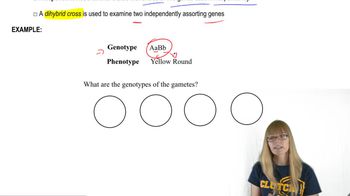Organisms with the genotypes AABbCcDd and AaBbCcDd are crossed. What are the expected proportions of the following progeny?
A–B–C–D–
 Verified step by step guidance
Verified step by step guidance Verified video answer for a similar problem:
Verified video answer for a similar problem:



 4:58m
4:58mMaster Gamete Genetics and Independent Assortment with a bite sized video explanation from Kylia
Start learning